Will ‘Voice Up Japan’ Encourage Japanese Women to Finally Speak Up About Inequality?
This newly founded youth organization is trying to change Japan — from within
Women's rights movements often fail to gain traction in Japan. Voice Up Japan is looking to fix that.
We’re only a few months into 2019 and already a number of troubling stories involving women’s issues have made the news. A member of J-pop group NGT48 was forced to apologize to her fans for causing them distress after posting online about how she was attacked at her own home by two men. And even though everyone agreed she was not the one to be blamed — at all — she’s off the stage and out of the group now and no one knows what happened to her. Female members of the Imperial Family have been denied the right to attend the throning ceremony of Crown Prince Naruhito—their own relative!—this May. And, considering there’s only one election to go before then, Japan is likely to miss out on reaching its goal to raise the proportion of female candidates in national elections to 30 percent by 2020. Meanwhile, recent movements to improve gender equality have had trouble catching even though such stories abound.
But there’s one new organization in town seeking to end gender inequality by eradicating the stigma associated with publicly speaking out against such issues.
Voice Up Japan was founded this January by a group of Japanese university students who are trying to change the status quo — simply because they believe that injustice is not something they can turn the blind eye to.
Three of them—Ryo Tsujioka, Asaki Takahashi and Tadashi Kaneko—were kind enough to speak to Savvy Tokyo right in the middle of finals week about the steps this up-and-coming organization is taking to stop gender discrimination for good.
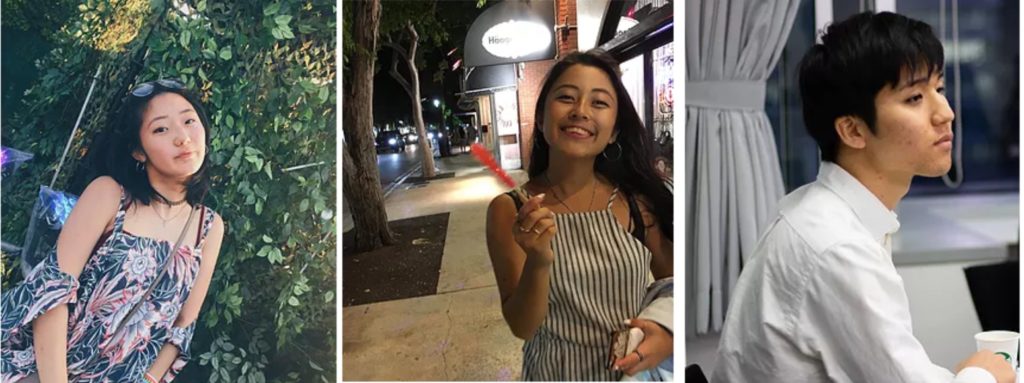
From left to right: Ryo Tsujioka, Asaki Takahashi, Tadashi Kaneko, three of the founding members of Voice Up Japan.
A simple question: Why don’t Japanese women speak up?
When I first moved to Japan I was confused. Where was all the groping and stalking I’d read so much about? In America, I’d been catcalled daily, yet, in Japan, it was as if I was invisible to passersby. However, to my horror, I soon realized sexual harassment and assault did happen—to many women. They were just so very well hidden under the beautifully decorated surface of Japan’s wa (harmony) and omotenashi (hospitality) that you had to dig really hard to find them.
Now I was confused for another reason—why weren’t they speaking out?
It turned out that this trend of silence is so deeply embedded in Japanese culture that most people abide by it without a second (or even an initial) thought.
Gaman — endurance — is often described as a law or virtue among Japanese.
“Japan has always strongly valued peace ever since WWII ended,” Takahashi explained to me. “This affected how people of Japan voice their opinions even about things that may hurt them. It was not accepted to actually speak up… There is a word in Japanese called gaman that also reinforces this taboo-ness of speaking up.” Gaman, a term rooted in Buddhism, means “enduring the seemingly unbearable with patience and dignity.” This highly regarded trait is often described as a “law” or “virtue” among Japanese.
Kaneko elaborated. “It is immature to get angry and raise your voice even when you experience injustice. You are expected to just laugh it off or smile and pretend you didn’t hear it. It’s not just on gender equality but almost on every issue. I have come across numerous articles and opinion pieces written by prominent women who scold female activists for acting ‘childish’ and ‘un-Japanese’.”
Speaking up about a subject as taboo as sexual assault has its own set of consequences which tend to add to the trauma victims have already endured. People who come forward are often criticized and even threatened—by women as well as men. For many, the shame and the name-calling just aren’t worth it, so they don’t say anything at all.
Voice Up Japan’s mission to give everyone a voice
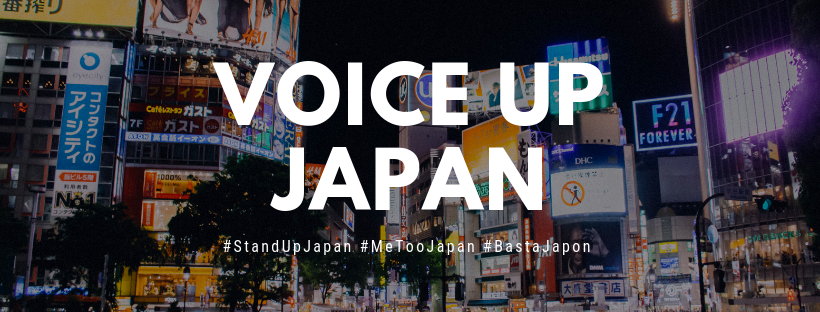
An article released last October by controversial Japanese magazine Shukan Spa! finally prompted one college student to speak out. Kazuna Yamamoto, a student at International Christian University (ICU) in Tokyo, became outraged at an article listing college campuses where drunk women were supposedly the most “sexually easy.” Even though her university wasn’t mentioned, she felt spurred to start a Change.org petition not only demanding the article be taken down but that such pieces cease altogether.
拡散お願いします! Japan released an article about a ranking of girls with easy access, specifying universities. #StandUpJapan https://t.co/r5oYoDzYMr pic.twitter.com/Qt61XrZ3X2
— Kazuna Yamamoto (@kazuuuuuuuus) January 5, 2019
“We demand that the media stops using words to discriminate women, objectify women, disrespect women and sexualize women,” read the petition, which was launched in January 2019. It went viral and gave birth to a hashtag, #standupJapan, that took off on social media. The petition was successful, gaining over 52,000 signatures and wide media attention. It also managed to successfully persuade Spa! to issue an official apology.
A few of the petition signers also attend ICU—they contacted Yamamoto asking if they could help in any way. These students came together and started Voice Up Japan.
Voice Up Japan’s mission is both straightforward and complex. “We are an organization that aims to create an environment where more people in Japan can speak up while advocating for Gender Equality in the Japanese Society.”
In a country that placed 110th on the World Economic Forum’s global gender equality ranking in 2018, their purpose is nothing short of challenging. Yet, the young students are idealistic and determined—the perfect combination for change making.
Non-strangers to gender discrimination
Since people who speak out are usually faced with so much negative backlash, I asked Voice Up what kind of reactions they’d experienced.
“Most of the feedback has been really supportive and we are thankful for that,” the Voice Up team explained. “Some of the negative comments we got were that we’re doing this because we hate Japan … We are trying to change this society because Japan is such a great place and we see Japan has the potential to become an even better place than it already is.”
“We also got a comment asking why we were raising our voices even though we were not part of the ranking. It does not matter what school was or was not listed; we are all university students and it affects all of us. If there is a problem that affects everyone, someone should speak up regardless of their identity.”
The students involved in Voice Up have had their share of experiences related to gender discrimination that inspired them to fight for change.
We are trying to change this society because Japan is such a great place and we see Japan has the potential to become an even better place than it already is.
Takahashi is a senior student double majoring in Physics and Sociology. She says her reaction to the petition prompted her to do something. “The fact that I was not as surprised and furious as I should have been made me question myself,” she said. “This petition made me realize that this is not right; that somebody needs to do something about this.”
People often question why she’s studying so hard when she’s “just going to end up married.” This used to intimidate her, but now she’s fighting against such regressive assumptions. “I really don’t want young girls facing this kind of discrimination that discourages them to pursue their paths in STEM fields.”
“There are so many other little incidents, almost every day, that I encounter…I see advertisements on trains on the way to school that discriminates by gender or reinforce gender stereotypes… people in my life that make comments about me studying Physics, a female friend’s job position changed to sales even though she signed the contract as an engineer, and so much more.”

Yareru gyaranomi: The tabloid magazine Shukan Spa! released an article in December 2018 ranking universities where female students are “easy to get in bed with” at drinking parties.
Tsujioka is a senior currently majoring in sociology and minoring in gender studies. She says she experiences sexism on a daily basis.
“I lived in England for middle and high school and when I returned to Japan for university, I was shocked how behind Japan is socially. People made sexist comments on TV and in everyday life and no one was speaking up about it.”
Tadashi Kaneko, a senior majoring in economics, has had similar experiences despite his alternate perspective.
“As a man, I have never been a target of a sexist attack myself,” he said. “One incident that I remember vividly is when I attended a job event at a well known Japanese company. There were several tables prepared…to explain subjects such as work-life balance, career building, and how to raise kids. When I went to the raising kids table, I was surprised to see that I was the only male student sitting there… Everybody looked surprised and the employee asked me, ‘Why are you here?’ I said, ‘Because if I get married and have a family, I will also take a part in raising kids.’ The employee still looked surprised and I realized she had never seen a male student coming to the table to ask questions.”
Takahashi makes it clear she doesn’t view their fight as a “women vs. men” issue and Kaneko agrees.
“I believe women’s’ rights are human rights. Everyone, not only women, ought to advocate for women’s rights. We are all responsible for achieving gender equality.”
I ask them if they believe the Japanese public is at a point where they can feel comfortable speaking out.
“I don’t think the general Japanese public is completely ready to start speaking out on those issues,” replies Takahashi. “But… we have some people telling us that we have given them the strength to start thinking about speaking up if anything bad happens. It may not be now but I have high hopes that it will be very soon.”
Voice Up Japan is only just getting started, and they have plans to keep bringing attention to other issues as well.
“We don’t want this to be a one-time thing.”
Voice Up Japan will be at the Women’s March Tokyo, scheduled for 5:30 p.m. on March 8, 2019 at UNU, the United Nations University in Shibuya. For other events, see here.
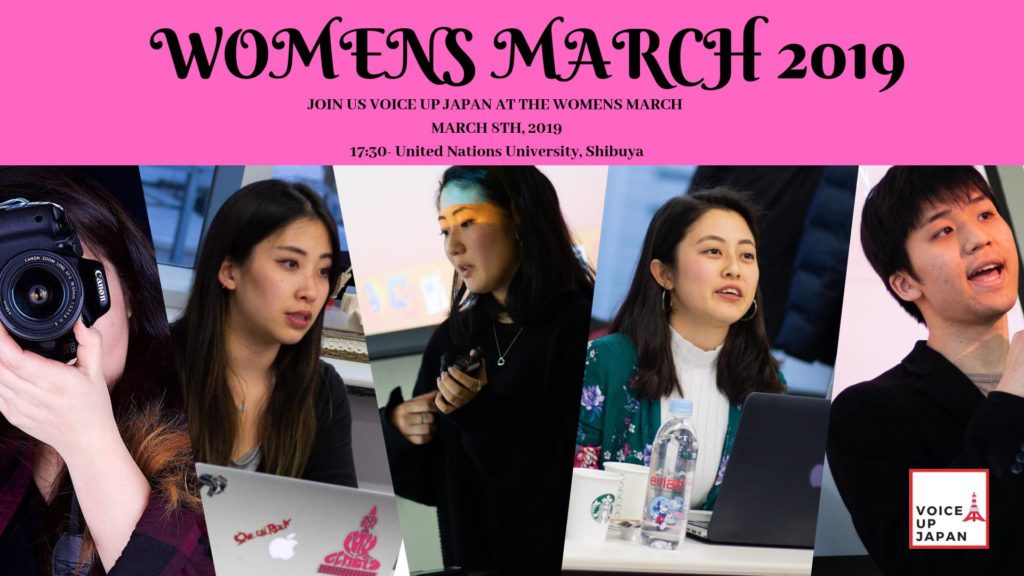
To learn more about Voice Up Japan and their message, visit their website at voiceupjapan.org and follow them on social media. Voice Up Japan merchandise is available here.












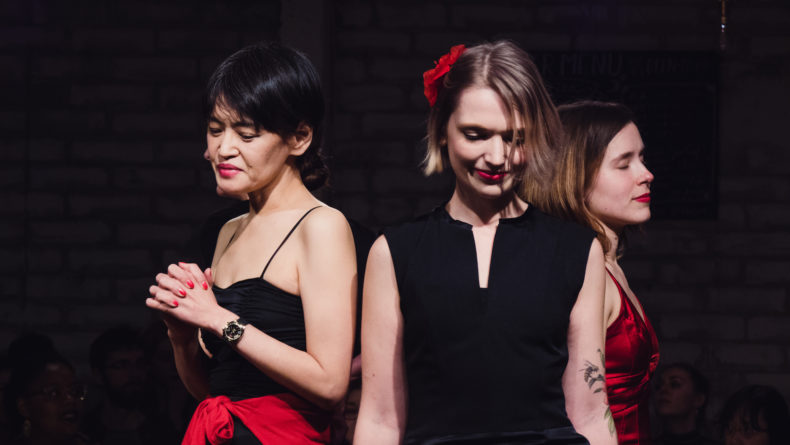
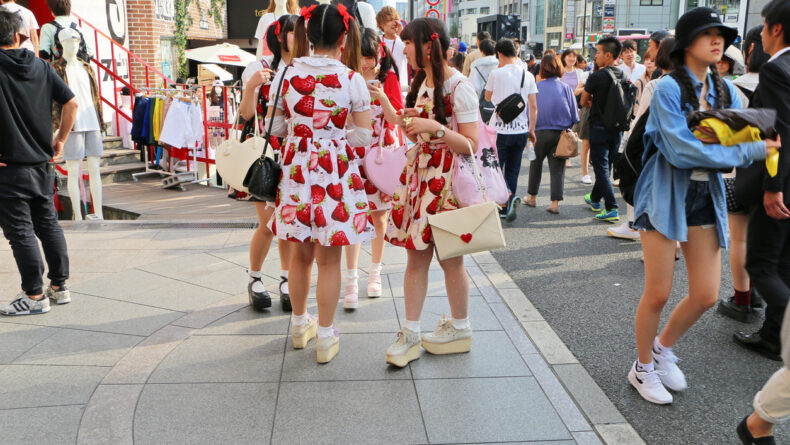
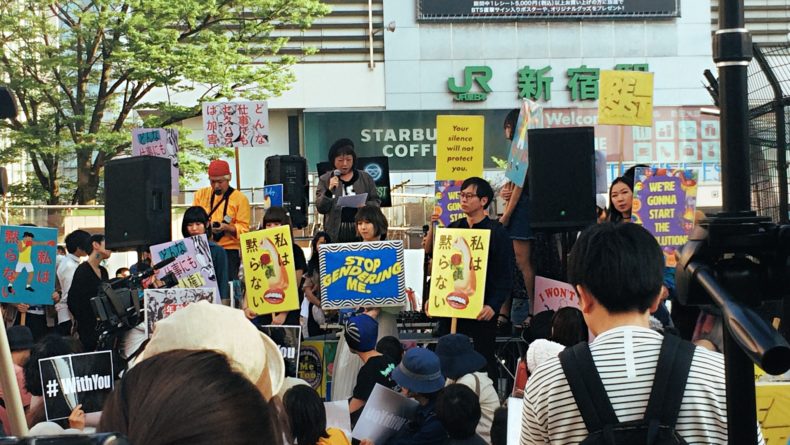

Leave a Reply